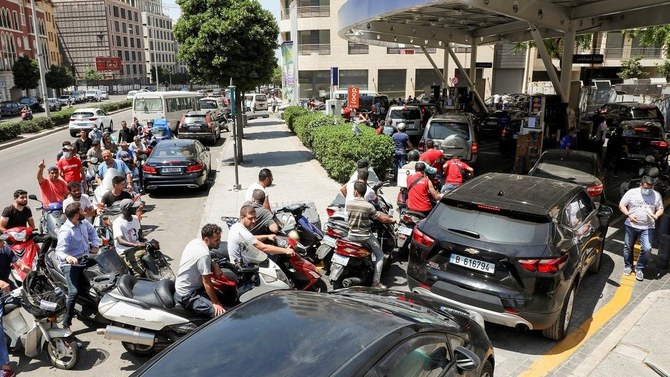BEIRUT: Fears were on Wednesday growing among Lebanese business leaders and citizens over the threat of an end to subsidies on all fuel products.
Concerns were raised as ministers from Jordan, Egypt, Syria, and Lebanon discussed a road map toward opening up vital supply lines for gas and electricity to the Lebanese.
Any decision to axe subsidies could lead to price hikes of almost all commodities in Lebanon, further adding to the deep economic and political crises already gripping the country.
More than 12 months after the Lebanese government resigned and with the nation teetering on the brink of collapse, politicians have still to agree on the formation of a new administration.
Georges Brax, a member of the gas station owners’ syndicate, said: “The $225 million allocated to subsidize fuel and electricity has basically dried up.
“If Lebanon’s central bank approves new credit lines, subsidies will persist, otherwise, subsidies will be lifted and then we will have to import fuel according to the dollar price on the black market.”
The dire social and economic situation in Lebanon has left many people and businesses without access to electricity, medicine, gasoline, or diesel and the collapse of the local currency has impacted on hospital supplies and services and led to sharp food-price rises.
Lebanese officials recently started talks with Syria over the transit of Egyptian gas and Jordanian electricity through its territory.
Hala Adel Zawati, Jordan’s minister of energy and mineral resources, invited her Egyptian, Syrian, and Lebanese counterparts to a four-way meeting in Amman on Wednesday that was also attended by experts and technicians from Lebanon’s electricity company and energy ministry.
At a joint press conference, she revealed that the meeting’s participants had agreed on “a road map to provide Lebanon with natural gas from Egypt.”
She said: “The meeting was preliminary and went very well. The infrastructure is almost ready to transit Egyptian gas to Lebanon, but we still have to check the network and gas facilities. We must verify that everything is ready to start the pumping as soon as possible.
“The next meetings will discuss the damaged infrastructure in Syria to transport electricity to Lebanon. Every Arab country will be responsible for the required cost to ensure the transit of gas to Lebanon,” Zawati added.
Ghassan Al-Zamil, Syria’s energy minister, said: “We will support any joint Arab effort that serves the Arab nation.”
And Raymond Ghajar, Lebanon’s caretaker energy minister, thanked “the brotherly countries” for their cooperation.
He said: “Lebanon today is in desperate need for the support of vital sectors. This step will enable us to benefit 450 power-generation plants and will enable the importation of electricity from Jordan in the future.”
Ghajar added that he hoped “to receive enough gas to generate 450 megawatts of electricity in Lebanon. We are working with the World Bank to secure financing for energy supplies.”
Egyptian minister of petroleum, Tarek Al-Mala, said: “After the interruption of the Arab Gas Pipeline for the past 10 years, we must check the whole network and gas facilities. We must also review some of the contractual terms.”
He added that a road map was being drawn up “with the participating ministers and Egyptian technical teams to repump gas via the Arab Gas Pipeline to Lebanon as soon as possible.”
However, head of the Syndicate of Private Hospital Owners in Lebanon, Suleiman Haroun, said: “A health crisis is about to hit the country in the next two weeks if subsidies on fuel are lifted. Even the rich would not have access to hospitals. We have reported that imports of medical supplies have stopped.
“The current tariffs force hospitals to bill patients for the price difference, which has become extravagant. I have previously warned that hospitals would only become accessible for the rich,” he added.
In a tweet on Wednesday, Issam Araji, head of Lebanon’s health parliamentary committee, said: “The financial collapse and greed have led to billing patients in US dollars or Lebanese pounds according to the exchange rate on the black market.
“Insurance companies cannot increase the tariff. Patients are the victims. They are paying 85 percent of the bill and companies are only covering 15 percent. The only solution is a rescue government. Otherwise, God knows what might happen.”















